Raising Up Leaders in Maine
Raising Up Leaders in Maine
Story by Carmel Palmer
Photos by Micah Martin
Article first appeared in Winter 2018
“I think God wants me to plant a church,” Will Cass confidently told his pastor, Ken Graves.
While Ken had believed it was time for CC Bangor, ME, to start planting churches, the man in front of him seemed an unlikely candidate. Nine years prior when Ken met him, Will was a red-haired 19-year-old with a mullet hairstyle attending Ken’s Bible study in the local jail. After his release, he had gotten involved in Ken’s fledgling church. He was like a little brother to Ken, but “he was always a hard learner,” Ken said. “I was always having to get on his case about something. So I told him, ‘You’re nuts. You’re not doing the things you’re supposed to now; why would God be sending you somewhere else?’”

Men join with Ken in prayer for new School of Ministry graduate Ryan Kizitaff.
In retrospect, Will sees Ken’s blunt response as very gracious. “My life was a disaster,” he admitted. “My marriage was in trouble, there was a lot of sin I hadn’t dealt with, and even in ministry I was doing my own thing instead of being concerned about what the Lord wanted me to do.” Will responded well to the conversation; in Ken’s words, “He hunkered down and became diligent.”
Meanwhile, Ken gave the go-ahead to another, seemingly more qualified, man who wanted to plant a church in the Trenton, ME, area. Before long, he quit, as did the second church planter Ken asked. So Ken reexamined Will, who in the four years since their conversation had become a steadfast servant instead of a rogue element. Though Will was now working a secular job, when Ken asked him to take over, he did not hesitate. Sixteen years later, Will is still senior pastor at what is now CC Downeast. “He became the one guy who stayed, who wouldn’t retreat,” Ken declared. “He proved himself there.”
"And the things that thou hast heard of me among many witnesses, the same commit thou to faithful men, who shall be able to teach others also." 2 Timothy 2:2
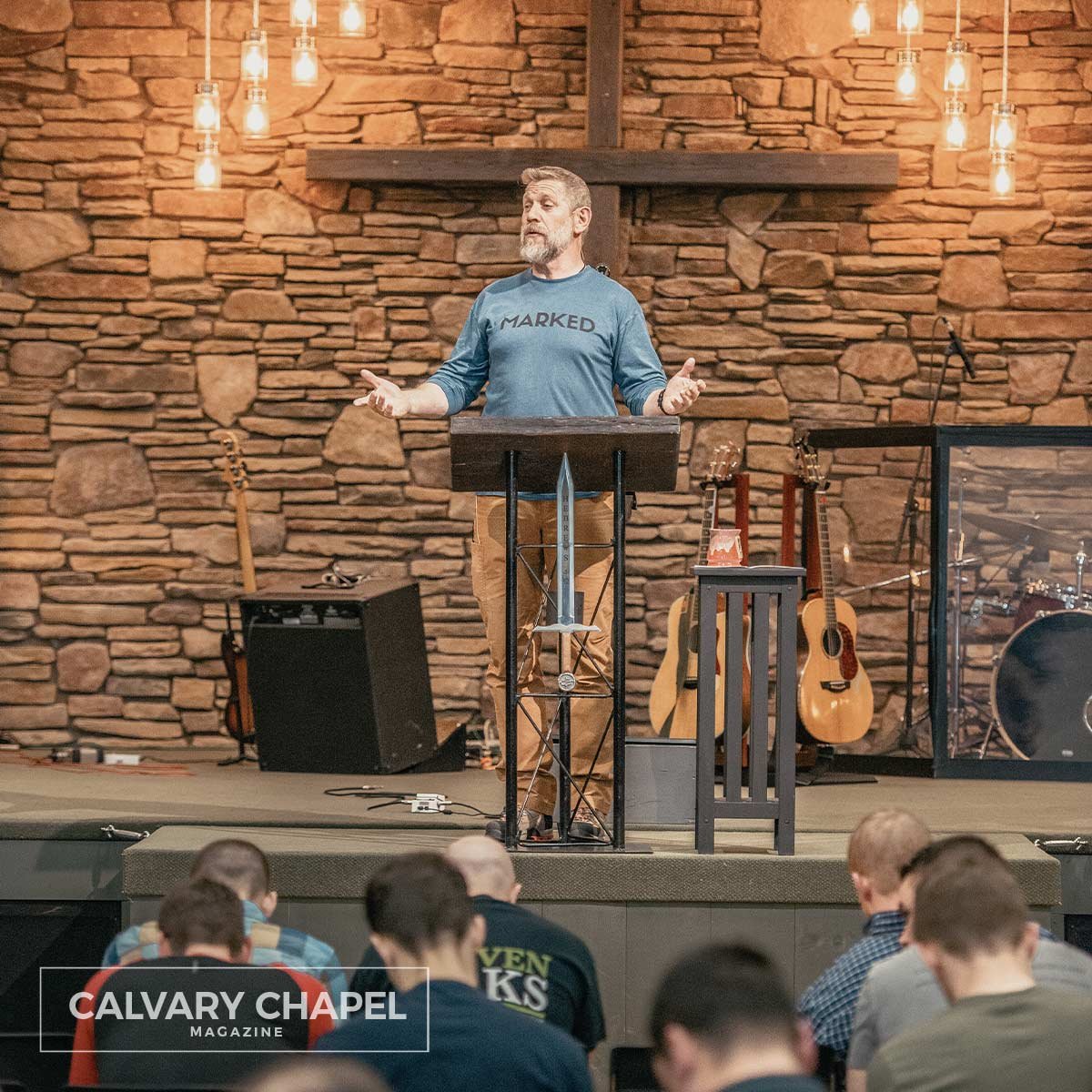
Ken has been teaching God's Word to those who attend Calvary Chapel Central Maine, formerly CC Bangor, since 1985.
CC Bangor, now CC Central Maine, has since its inception prioritized church planting throughout the state of Maine. “There was no war room or demographic studies, no big plan,” said Ken. “All I had was the example of Pastor Chuck and the Great Commission. It was just a matter of passing on truth and encouraging people to go tell others.” Today, the church has nearly a dozen official church plants ranging from Maine’s southern coast to the Canadian border.
Broken and Rebuilt
“The state of Maine is like many Caribbean islands,” explained Ken, “in the sense that there’s a side of the island that is all resorts and behind the fences there’s a poor community. We have a southern coast the Hollywood crowd dwells in, and a poor, rural region. I’m from the poor part.” Like many of those CC Central Maine now ministers to, Ken came from a broken family. His father left when he was six and died a couple years later. Ken’s mother had been severely abused by her own father and fled from him as a teen only to end up suffering the same from Ken’s dad. She spent most of Ken’s childhood trying to find love in all the wrong places. His family lived on welfare in a shack they shared with rats. “Life as a boy was spent protecting my four sisters and figuring out what we were going to eat. My thoughts, at times, were suicidal.”
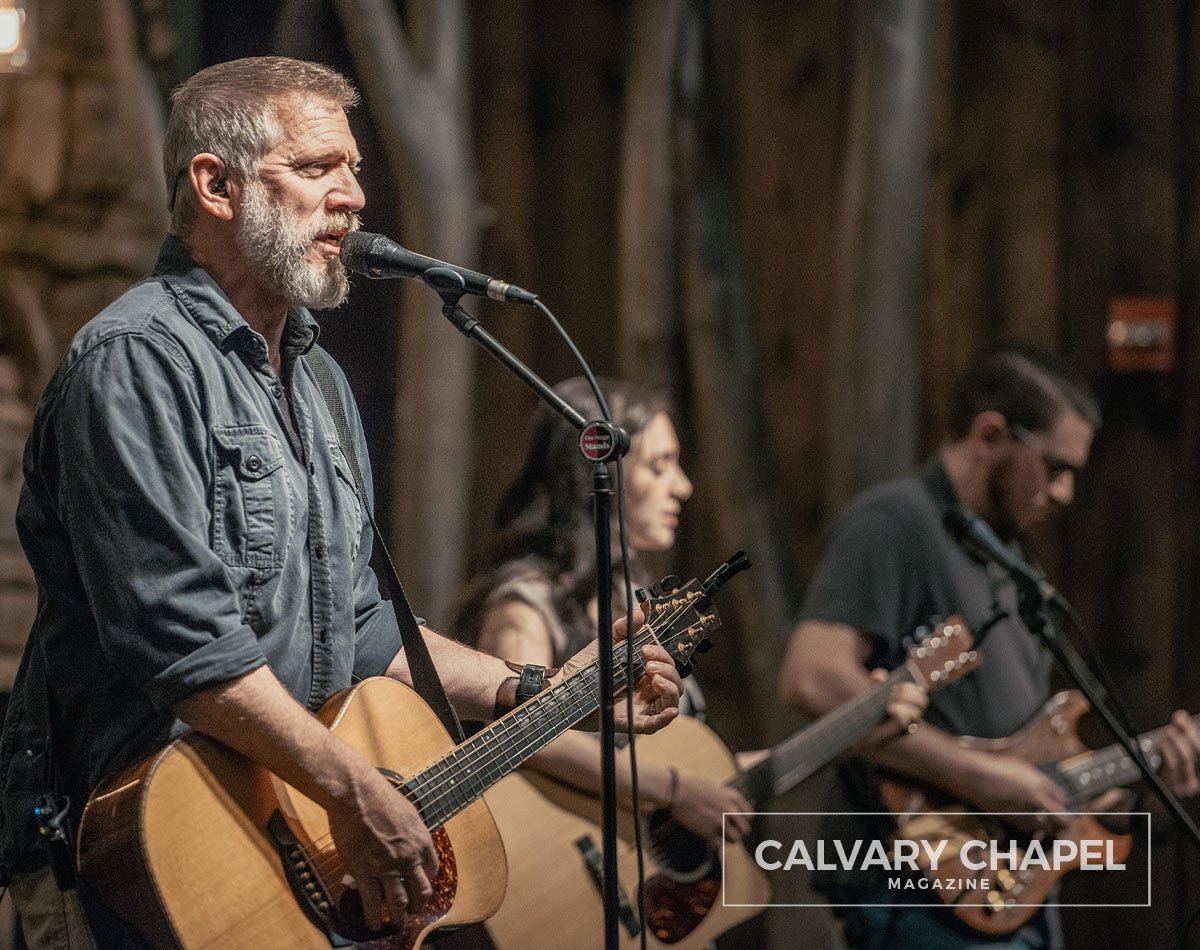
Pastor Ken Graves leads his central Maine congregation in worship.
Even in these dark circumstances, spiritual light managed to break through. The difficulties caused Ken to ponder life’s purpose at an early age. Despite her lifestyle, his mother had come to know Christ before marrying Ken’s father and had shared the Gospel with her children. The little spiritual knowledge Ken had kept him from following through with his suicidal thoughts and placed a burning hope in him that if he could just read the Scriptures, he would find answers.
A middle-school science teacher became the catalyst Ken needed. “I will never forget Larry Esancy,” Ken declared. “It wasn’t so much what he did but who he was and how he lived. He had a peace and confidence about him, and when he talked about life, he spoke with authority. He knew the answers, and they were found in the Bible that rested on his desk every day.” Although Mr. Esancy only used his Bible for personal reading, its very presence on his desk offended the school administration, who relentlessly tried to force its removal. Ken wondered, What is it about this book that makes everyone so afraid? One night he opened a Bible to the beginning of Matthew and kept reading until he hit Luke 17:33.
"Whosoever shall seek to save his life shall lose it; and whosoever shall lose his life shall preserve it." Luke 17:33
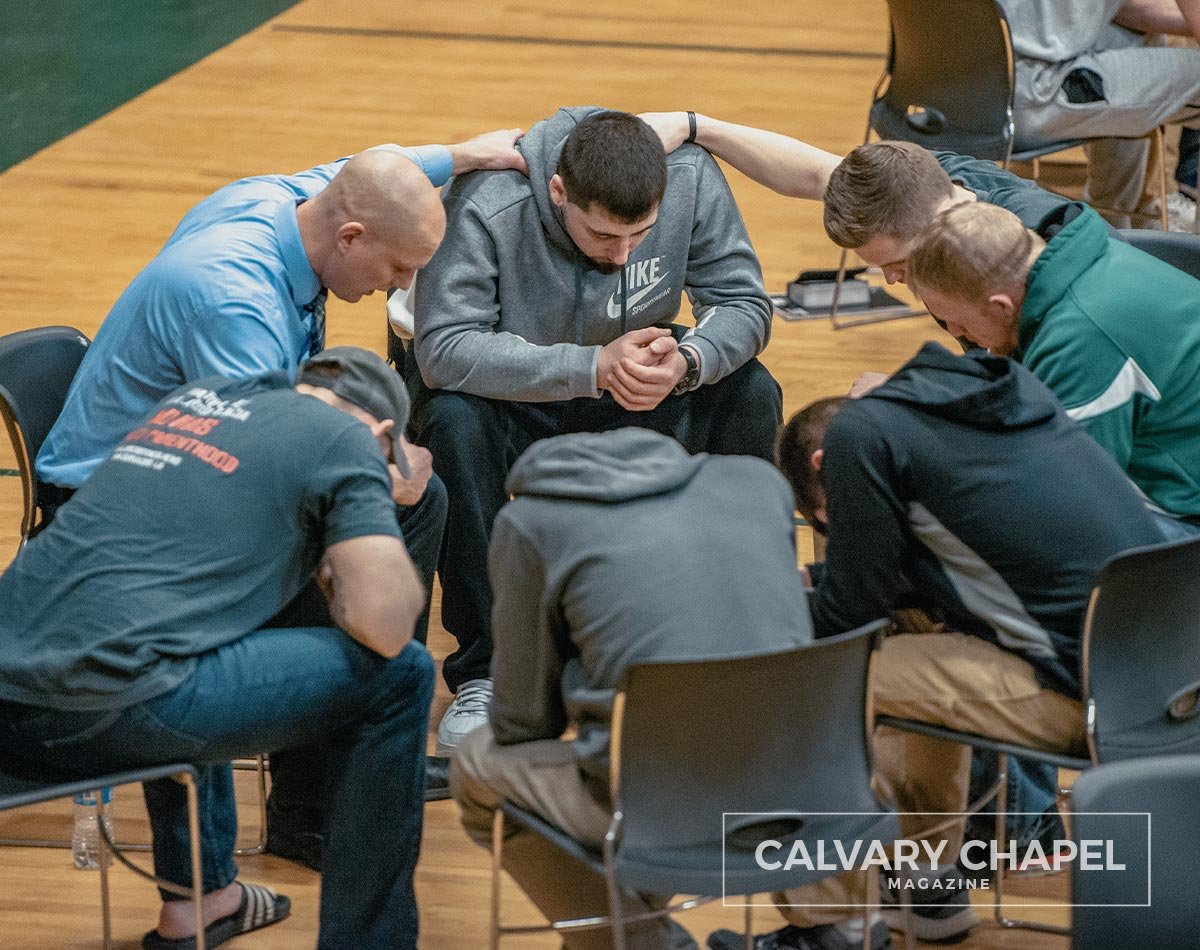
Men pray for each other as they work through addictions at CRD.
“I knew God was calling me to preach the Word,” Ken testified, “so getting saved and being called into the ministry was a one-time event.” Passionate in his new call and desperate to be discipled, Ken walked or hitchhiked the 20-mile journey to Bangor to hear preachers, quit school at 16 intending to preach full-time himself, and eventually spent four years in the Deep South participating in a residential discipleship program. Everything seemed to be coming together—at 20, Ken was engaged to the daughter of the program’s director, who was like the father he never had, and was being groomed for leadership. Yet increasingly Ken felt he was being shoved into a mold he did not fit. When it all came to a head, Ken lost his father figure, his fiancée, and all the plans he had for his future. For ten days, he fasted and prayed, seeking God’s plan for his life.
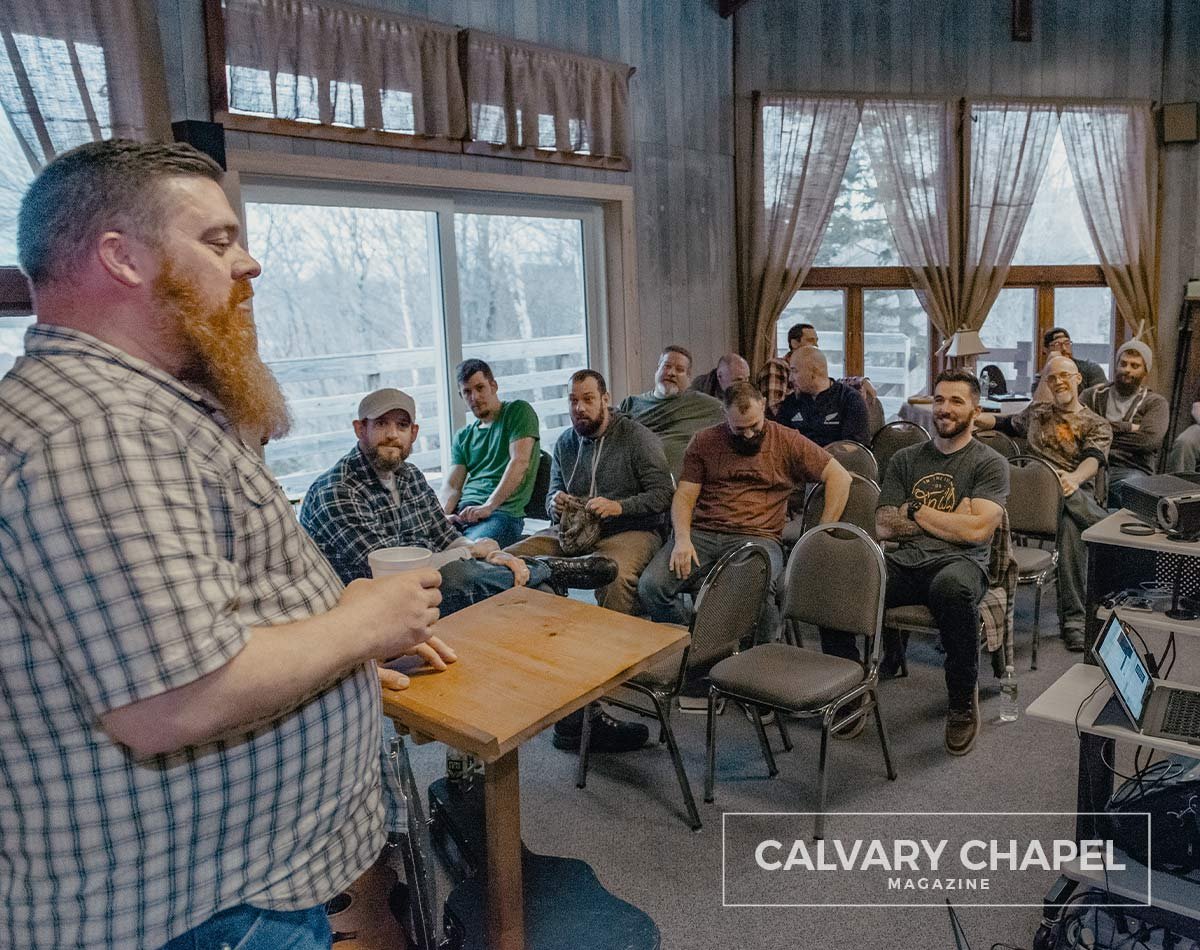
Pastor Will Cass teaches men from God's Word at the Pastors Huddle.
The answer was both clear and horrifying to him: return to Bangor. His response was, What are you trying to do, Lord, kill me?! Bangor was remote, and Ken expected God’s call to bring him worldly success and fame. Indeed, returning to Bangor meant crucifying his pride and ambition and submitting fully to God. Grudgingly, he did. Initially, the results of his obedience seemed less than spectacular. He struggled to get by while playing in a Christian rock band and preaching in the local jail. However, when Ken chose obedience, he could never have guessed how deep a love God would give him for Bangor’s people; that some of those converted criminals would become pillars of his future church and some of its first church planters; or that it would place him exactly where he needed to be to meet Jeanette Prudhomme, a Californian tourist visiting Bangor for one day.
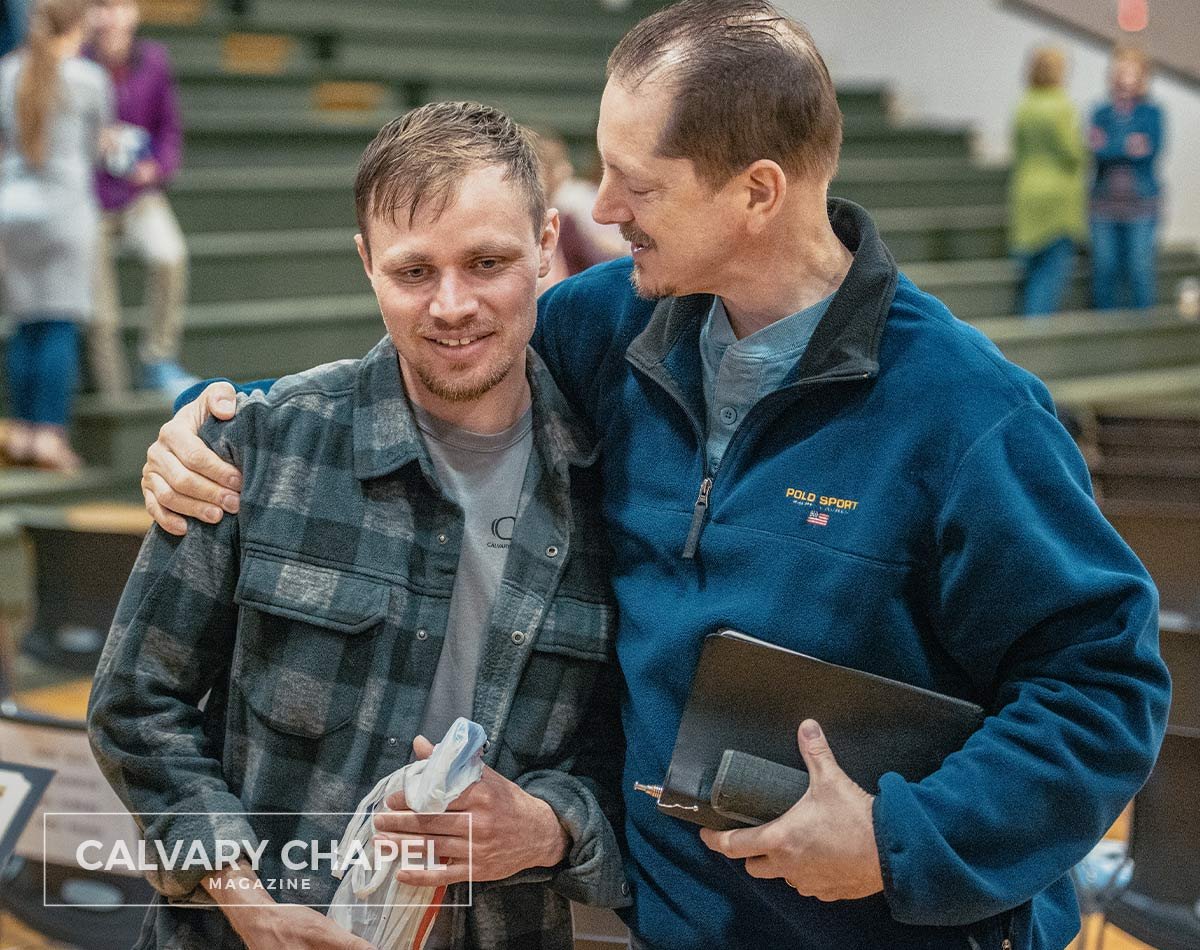
Ron Pomeroy congratulates Ryan Kizitaff on his recent graduation.
The peace Ken felt the moment he saw Jeanette convinced him that she was the helpmate God had for him. Within four days, he convinced her to marry him. The couple began life together in Jeanette’s hometown, Thousand Oaks, CA, attending the local Calvary Chapel. Ken reminisced, “Up to this point, I never fit anywhere. I looked for spiritual leaders to follow, but found none. What I saw in Calvary Chapel was biblical Christianity. I remember thinking, I always knew this existed! This is the Christianity that I’ve read about in the Book of Acts.” Yet the call to Bangor remained. A year later, in 1985, the couple returned to plant a church.
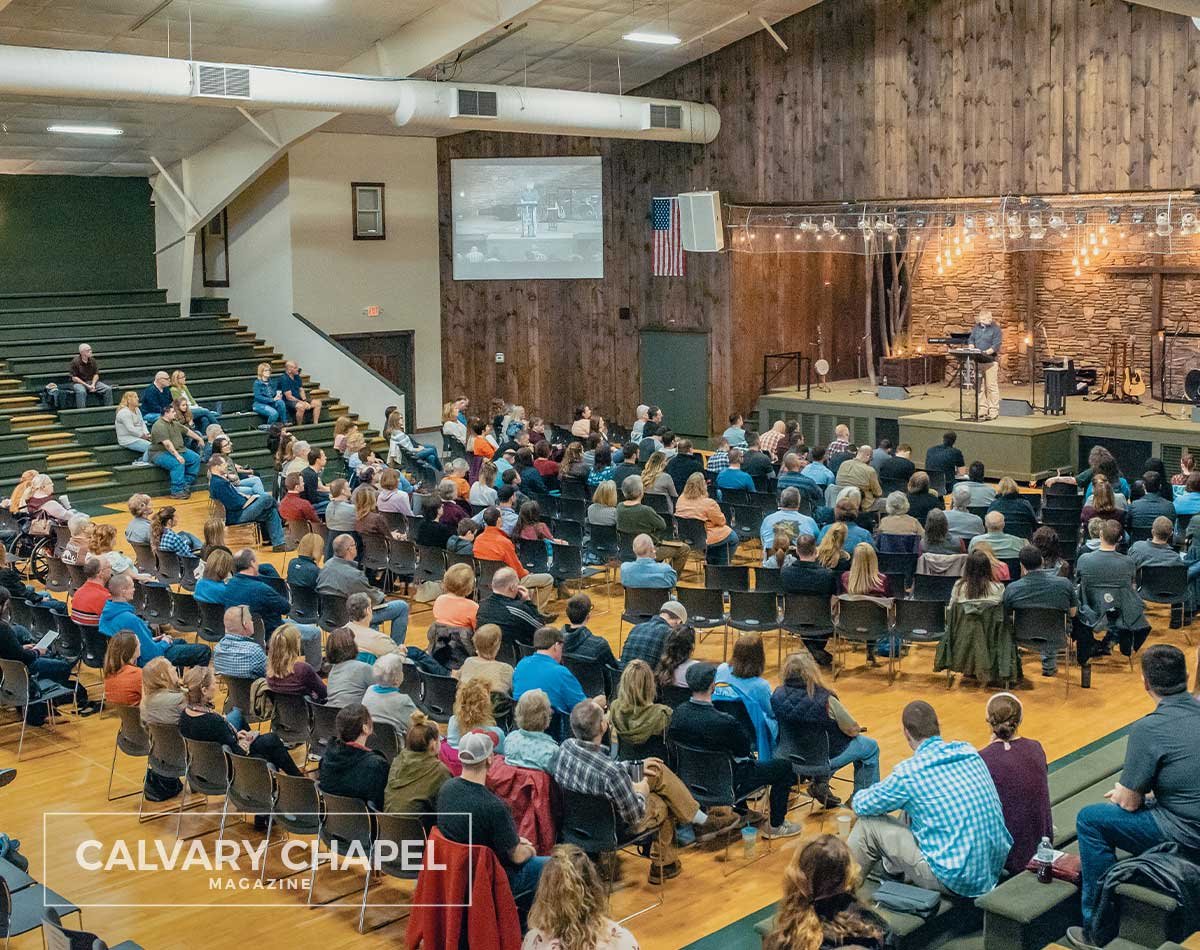
The congregation is attentive as Ken teaches verse by verse through God's Word.
Like many church planters, their first decade was grueling and gradual. They struggled to support their growing family. They faced spiritual opposition and human suspicion in an area unfamiliar with the Calvary Chapel movement. Years of coffeeshop concerts, Bible studies, jail outreaches, and witnessing eventually yielded a faithful fellowship of roughly 10 people meeting in their apartment. From there, the church slowly gained momentum. By 2002, over 1,000 people attended. Through Bible teaching programs on television and their radio station, WJCX, they reached many others who would not normally enter a church. Unconventional outreaches such as the Calvary Chapel Grapple, where the sanctuary was converted into a wrestling arena, connected with the tough, self-sufficient local men and translated biblical concepts in a way they understood. At this point, when many pastors would be prioritizing bringing more numbers in, Ken became focused on sending people out. David Homchuck, an elder during that time, explained, “Ken has never been about amassing people to himself for his own church. His vision has always been for churches planted throughout Maine.” David remembered the elders’ meeting where Ken broached the subject with his typical straightforwardness. “We lightheartedly say he kicked us out,” David laughed, “but it came from a very sincere heart. There were about twenty of us sitting in this huge circle. He looked around and said, ‘There’s too many of you guys here! You need to get out and start a ministry.’ Nothing changed immediately, but in the next year, five of us felt called to go.” To his surprise, David was one of them, though he had never intended to be a pastor or even an elder when he began the Bible study that grew into what is now CC Maine Highlands in Dover-Foxcroft. “What intrigues me about CC Central Maine,” reflected David, “is that though the discipling is very intentional, it’s done in such a way that you may realize a year later that you’ve been discipled and mentored, not always aware that the mentorship was going on—you were simply given opportunities to serve.”
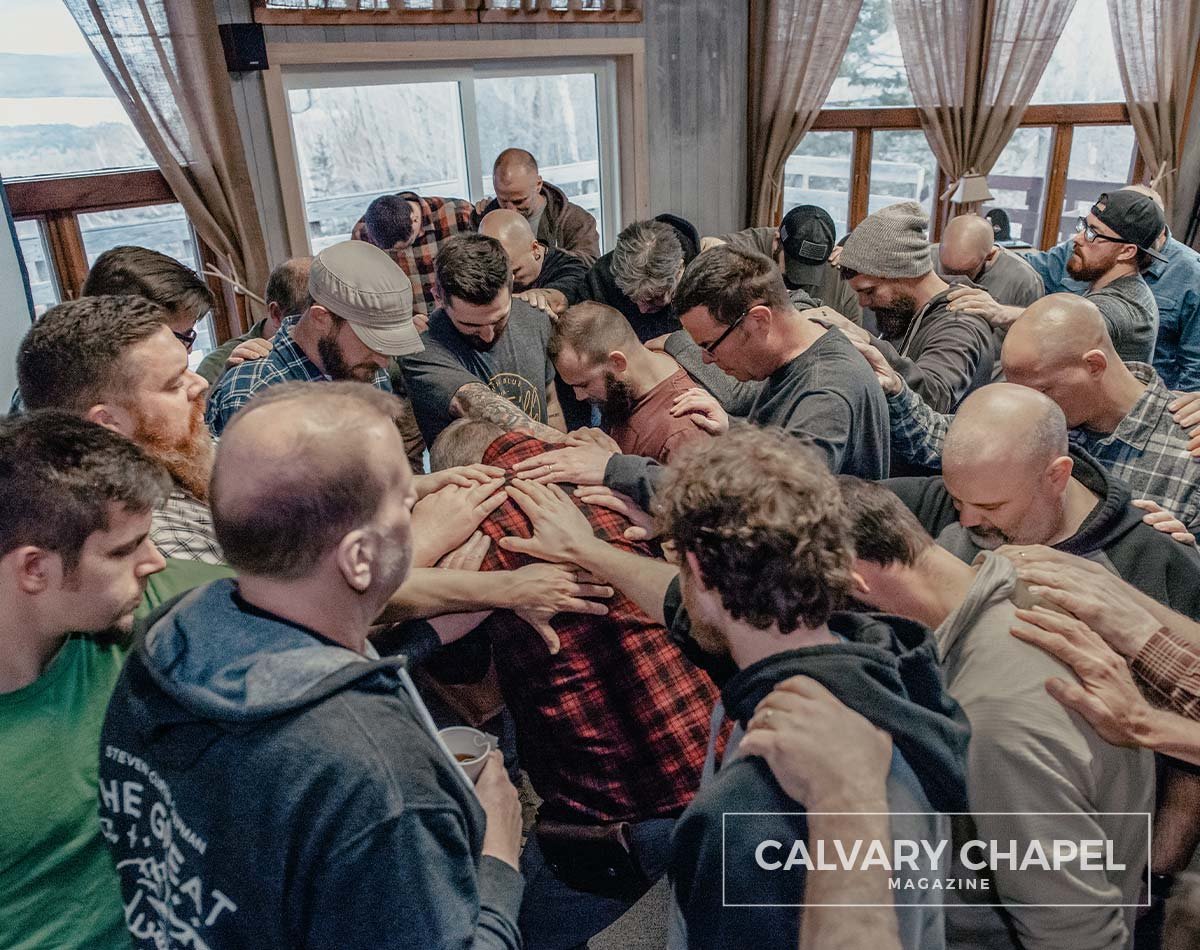
Men lay hands on Ken, praying for him before the start of the pastors' gathering.
Heart of Discipleship
Over the years, Ken has repeatedly “kicked out” his church elders whenever their meetings get too full. “As pastors, we must try not to collect people,” Ken stressed. “We have to be thinking about the cause of Christ, not our own ministry, and be willing to lose good people for the sake of it. Just like with our own children, we raised them to go. We can’t keep them or we rip them off. We have to thrust them out into the big adventure.” Though Ken may suggest church planting to men he believes are ready, they must hear from God personally before he seriously considers sending them. He has also learned to look for men who talk more about their burden for the lost than their own plans; for wives who are fully on board; and those who are already leading. “Nobody’s a leader unless they are first a man under authority,” Ken stated. “A man under authority will have authority, and it’s demonstrated in the fact that people look to them.”
"Ye know ... after what manner I have been with you ... how I kept back nothing that was profitable unto you, but have shewed you, and have taught you publicly, and from house to house." Acts 20:18b, 20
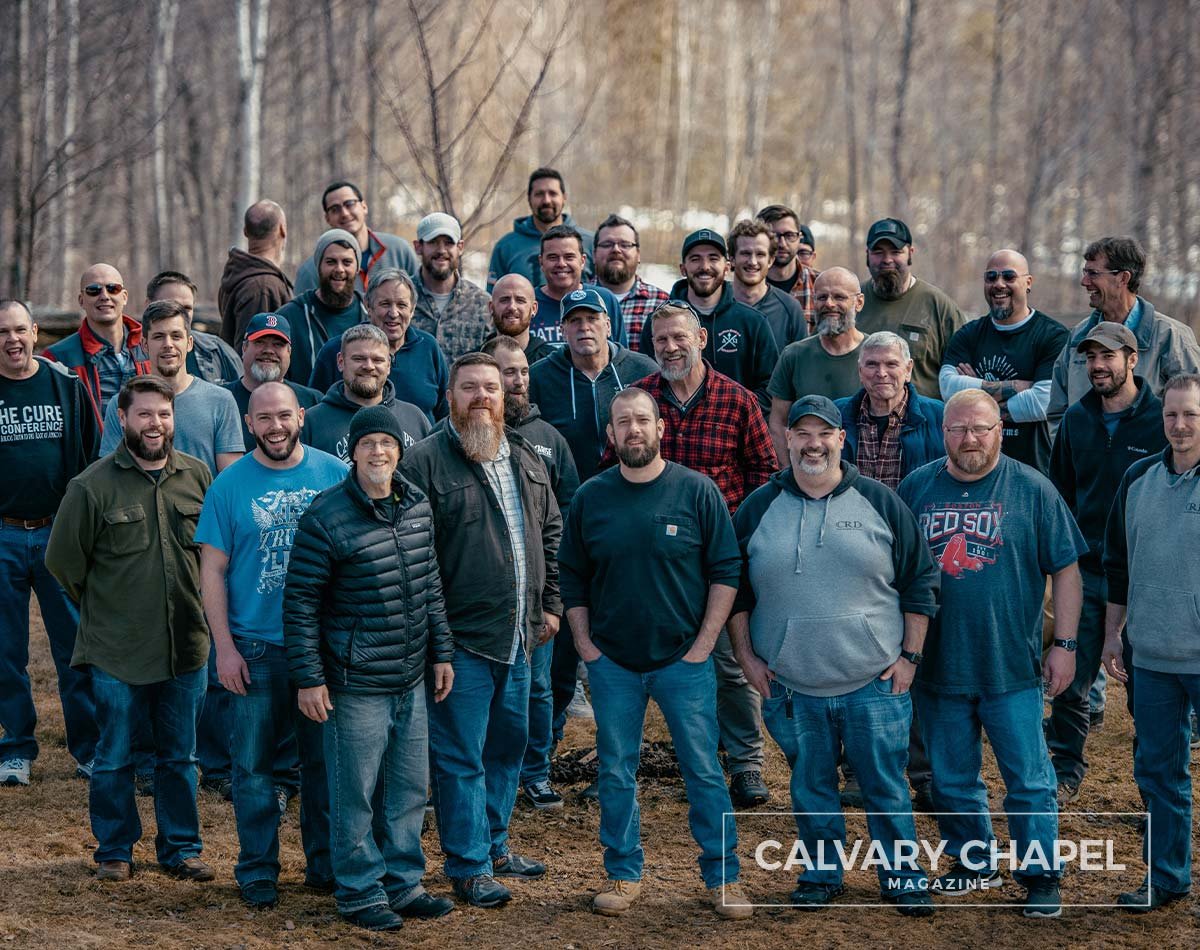
All the men representing the Calvary Chapels in the state of Maine gather together for the first Pastors Huddle in many years at the Blueberry Mountain Bible Camp and Retreat Center in Weld, ME.
Sending a church planter is not the end of discipleship but the next stage. Ken said, “That little pastors conference in Acts 20 tells us that discipleship is verbal instruction together with modeling. It is being with people through seasons and demonstrating how seasons ought to be done.” Discipleship is particularly crucial in what Ken refers to as “the slow season,” a church plant’s difficult beginning. “The whole first decade for me was a lot of energy output with very little sleep. I was really tired, and it felt like I wasn’t even making a dent. Add to that the dismal stress of trying to make a living in a rural area.” Months behind on rent and struggling to feed his family, Ken began questioning if he had heard God correctly. At his breaking point, he left a brief message with Pastor Chuck’s secretary saying that he thought he should quit. To his surprise, though he and Chuck had never had contact, Chuck called him back. He listened as Ken vented and occasionally gave a knowing chuckle that quietly referenced his own experiences. “He was very fatherly,” Ken remembered. “He told me I wasn’t crazy, that I was ministering in a hard place, and I just needed to continue in what God called me to do.” They prayed together, asking provision for Ken’s rent, and then hung up. Two days later, Ken received a check in the mail from Chuck’s personal account. It brought his rent up to date. “I’ll never forget that check,” he declared, “but also, right about that time, that season ended. Doors started opening and all my circumstances changed.”
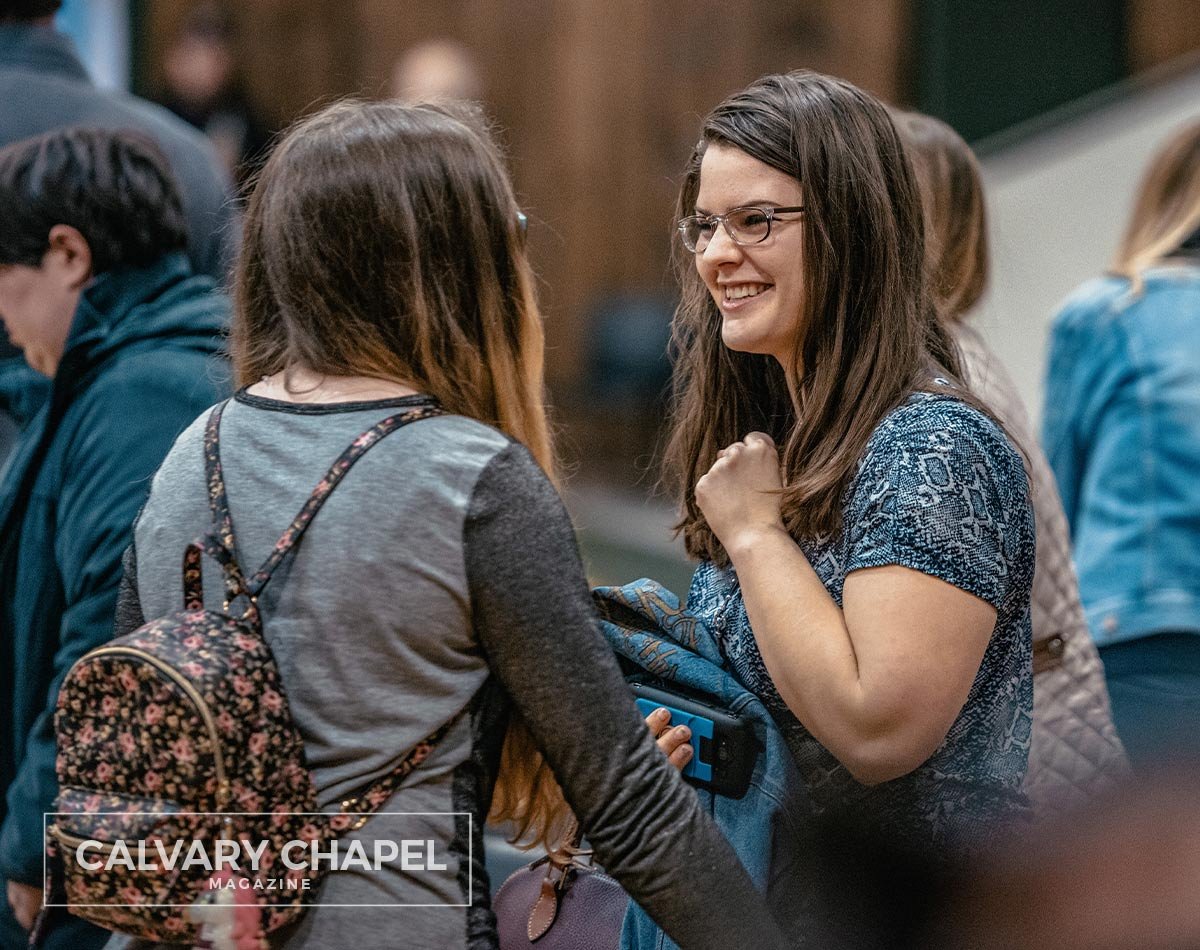
School of Ministry student Beth Moody enjoys fellowship after Sunday service.
Years later, at his own breaking point, David Homchuck called Ken. “I was overwhelmed by what felt like a tremendous betrayal from someone then attending the church. I started thinking, Maybe I’m not the guy. I’d already told the Lord I wanted to quit, that I was happy being a carpenter and never needed to be a pastor. But Ken had always said to call him, so I called from work one day. He just said, ‘I’m working at home; come over.’ When I got there, he said he needed to pull a pump out of a lake, so we jumped into the Jeep and drove up to this mountain lake and pulled out this pump, and the whole time Ken was listening and encouraging me. What I heard Ken saying was that you never have to feel like a failure if you’re obedient to what the Lord calls you to do. That has served me for over 15 years in ministry.”
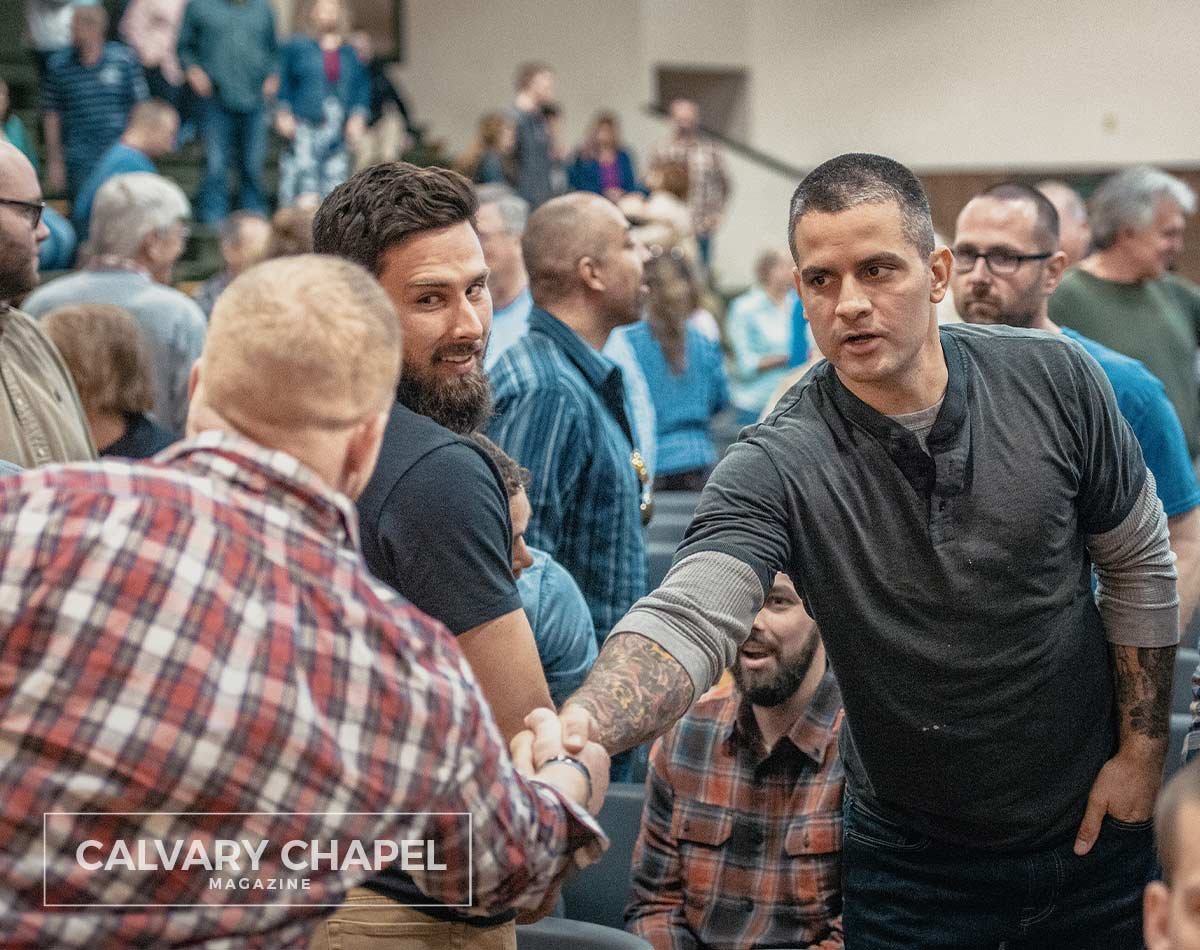
Men warmly greet one another during fellowship time at CC Central Maine.
Ken gives his pastors wide latitude to make their own decisions but makes sure he stays connected. “I’ve learned you cannot over-communicate,” he said. “Paul’s pastoral epistles are evidence he kept in touch. It was nowhere near as easy for him. Those letters had to be carried from one land to another as people were traveling and there was an opportunity. Think about that, how he went out of his way to address issues and encourage or warn them. It’s important that we stay in touch. And we have to make an effort. It has to be deliberate.”
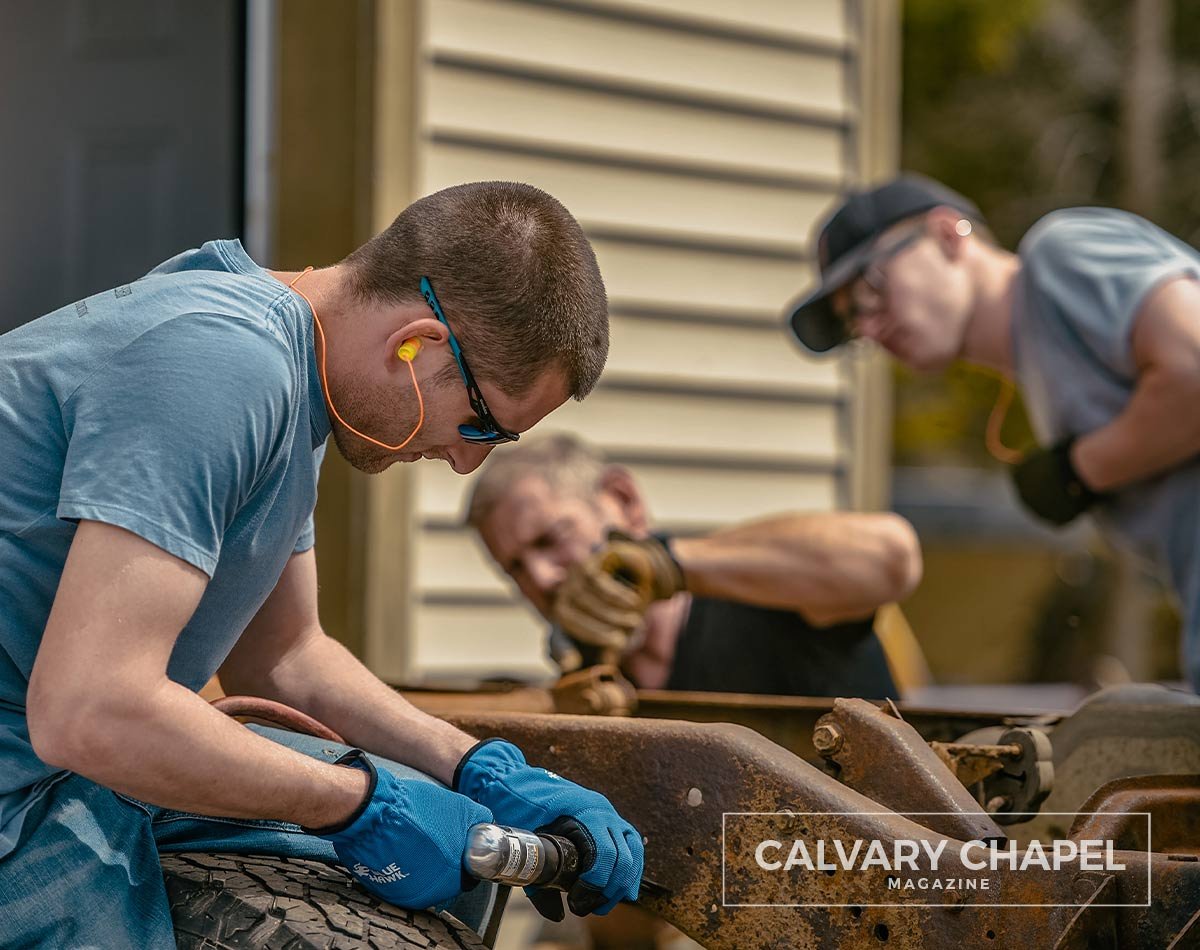
Men at CRD work with Ken in the auto body shop, gaining practical skills.
Men Who Endure
“The thing to remember in church planting,” Ken concluded, “is that it’s quality over quantity. The Lord’s biggest investment was not with multitudes but with the faithful handful. Generally, the philosophy in modern ministry seems to be: Go to Bible college; if you’re talented, you get a big church, prove yourself, and keep moving up. Well, that’s not what we teach. If God calls you somewhere, you stay there until you die. We are the people who go where others don’t want to. We go and stay. We need more of that—we need men who endure.”
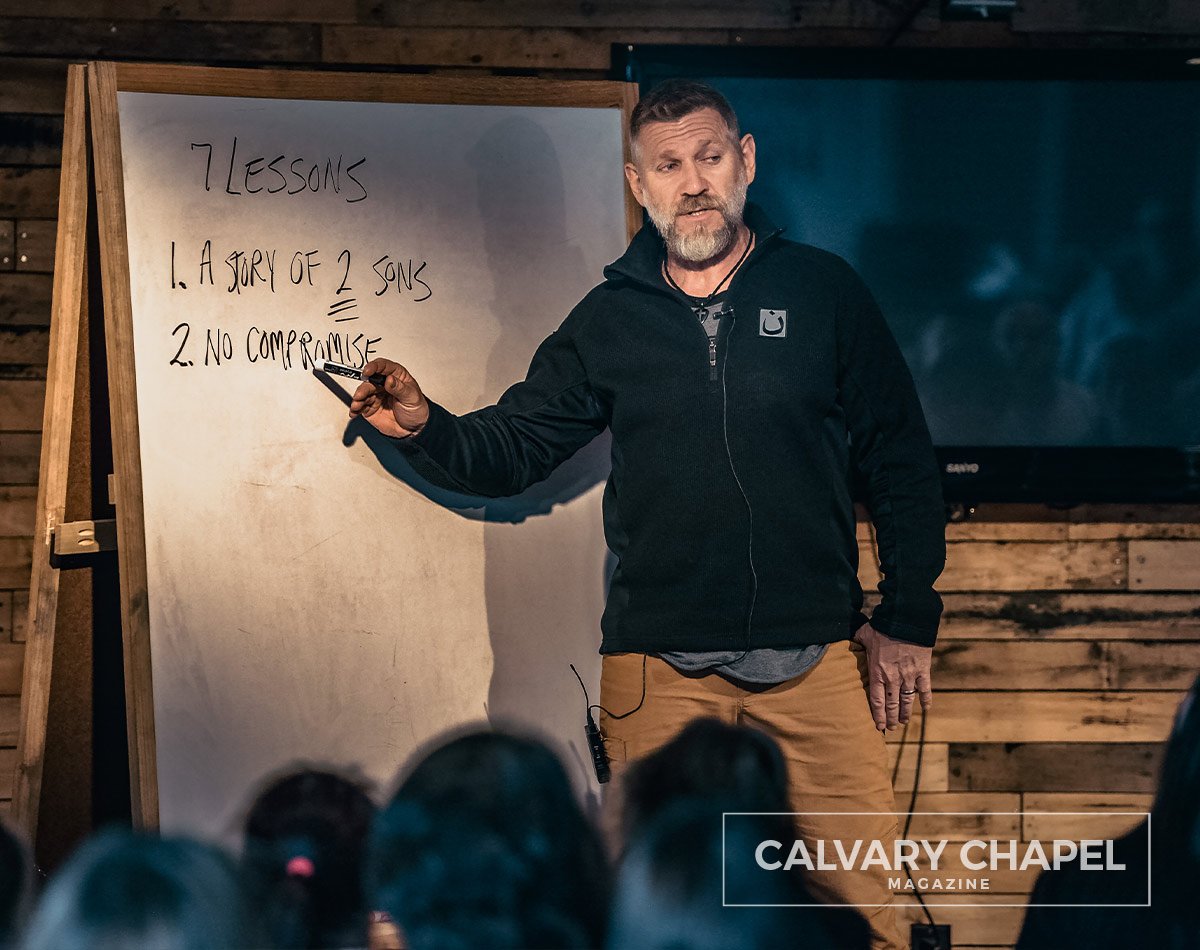
Pastor Ken Graves teaches men and women at Calvary Resident Discipleship (CRD).
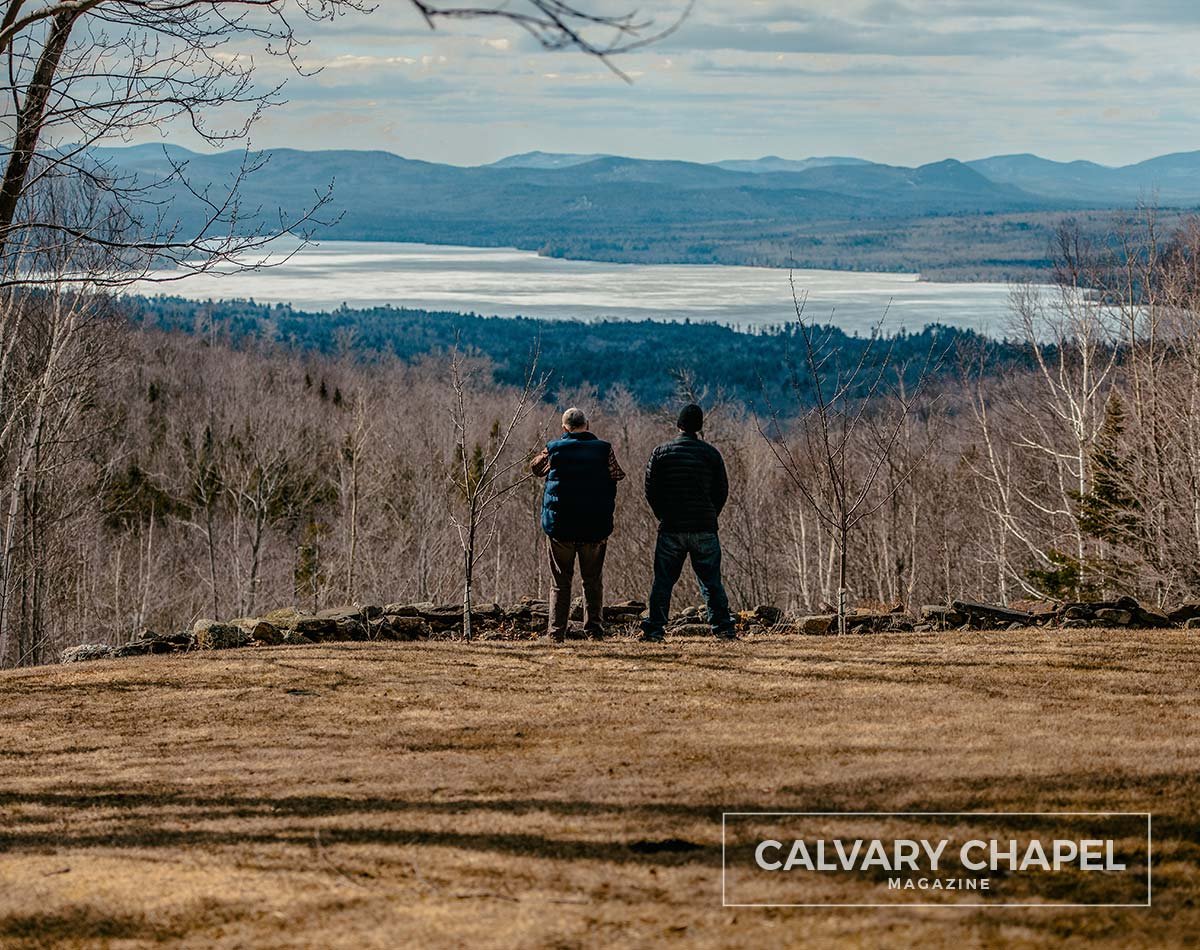
Two men take time to appreciate God's creation as they observe Webb lake and the winter landscape.
All verses above are quoted from the King James Version.
© 2020 Calvary Chapel Magazine. All rights reserved. Articles or photographs may not be reproduced without the written permission of CCM. All Scripture quotations, unless otherwise indicated, are taken from the King James Version. Copyright © 1982 by Thomas Nelson, Inc.® Used by permission.

